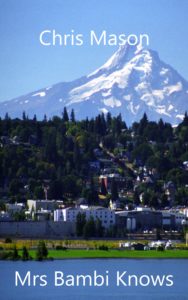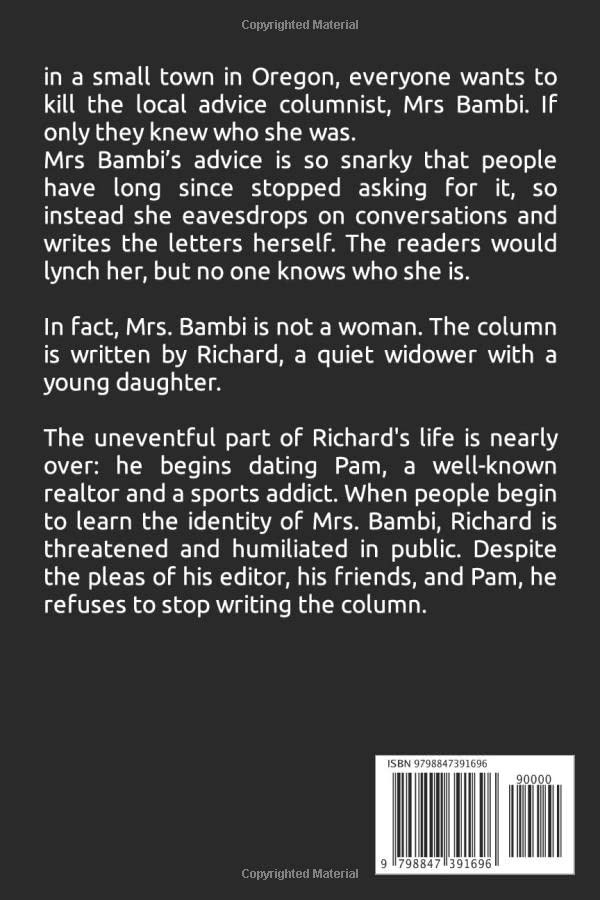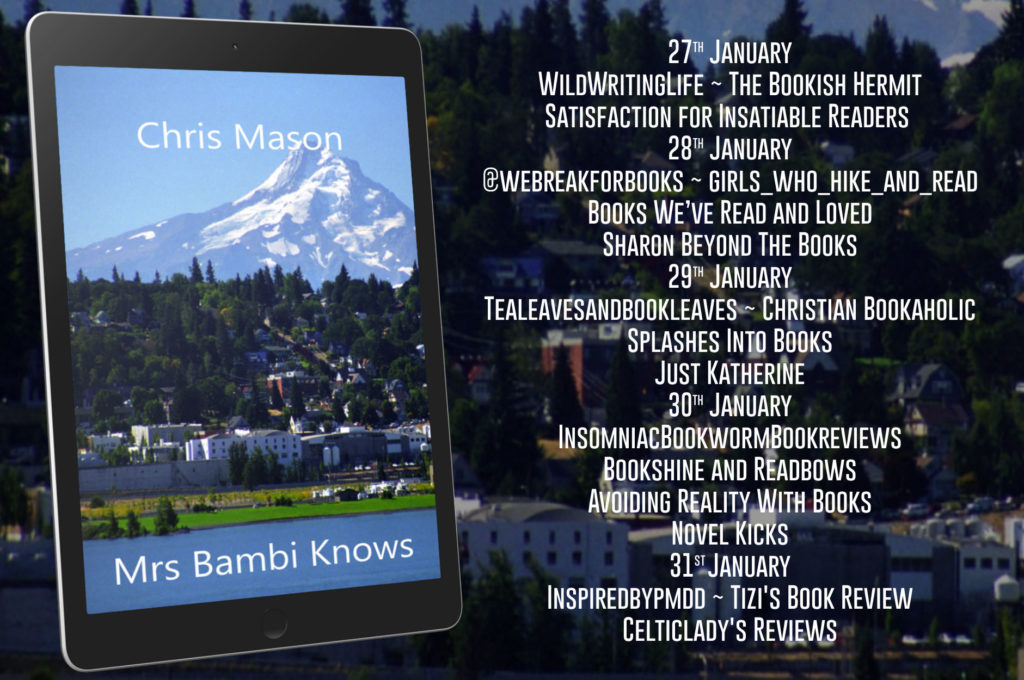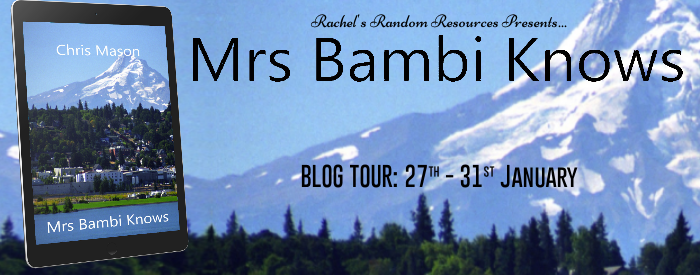Small Town Life
Mrs Bambi Knows by Chris Mason is a delightful contemporary novel about life in small town America.
The town comes to life under Chris Mason’s pen. I could ‘see’ the main street, A.M’s dress shop and Clarence’s farm to name but a few. Chris Mason’s words really evoke small town life – think Little House On The Prairie but brought up to date. It is a charming place to live.
There are many friendly residents with unique personalities. They look out for each other but gossip is rife! Your business is definitely not your own.
Single Dad, Richard, has a secret – he is Mrs Bambi the agony aunt in the local paper. He has a dry sense of humor and is very tongue in cheek with his advice – but the town is baying for blood – who is the outrageous Mrs Bambi?
Richard has a multi-facetted personality. He is kind and generous, and very philanthropic. He likes to donate anonymously – until that secret is out!
Chris Mason has created a most charming book with an eclectic set of characters. This is a wonderful light-hearted read that I loved.
I received a free copy via Rachel’s Random Resources for a blog tour. A favourable review was not required. All opinions are my own.
JULIA WILSON
Mrs Bambi Knows
In a small town in Oregon, everyone wants to kill the local advice columnist, Mrs Bambi. If only they knew who she was.
Mrs Bambi’s advice is so snarky that people have long since stopped asking for it. Instead she eavesdrops on conversations and writes the letters herself. The readers would lynch her, but no one knows who she is.
In fact, Mrs. Bambi is not a woman. The column is written by Richard, a quiet widower with a young daughter.
The uneventful part of Richard’s life is nearly over: he begins dating Pam, a well-known realtor and a sports addict. When people begin to learn the identity of Mrs. Bambi, Richard is threatened and humiliated in public. Despite the pleas of his editor, his friends, and Pam, he refuses to stop writing the column.
The only thing that can prevent disaster is for the town to finally learn the whole truth about Richard, which is much larger than the simple mystery of Mrs. Bambi.
Set in 1995, Chris Mason’s skillful storytelling brings a tale of humour and romance – and not a little peril – charmingly to life in the mind of the reader.
Purchase Links
https://186publishing.co.uk/pick-of-the-best
Author Bio –
Born in Ohio, Chris has moved around too much for anyone’s good, living in several places that might be considered tourist attractions. He mines those experiences for the settings of his books.
He lives in Florida with his wife, two dogs, two cats, and a smart-aleck macaw who has pets of her own.
Q and A from Splashes Into Books
Where did you get the inspiration for the book/series?
When I was younger I liked to read the advice (agony aunt) columns in the newspaper. Yes, I did desperately need advice, but that’s not why I read them: I found them enlightening about the human condition, but more importantly they were amusing. The questions were occasionally outrageous, but the answers were often quite funny.
While browsing in a book store one day, I found a thin volume about three young professional women in New York City who—perhaps for fun, perhaps to fill some deep need to be busybodies—set up a stall on the streets of the city at which they dispensed free advice. You could ask them anything, and they’d do their best to help you.
While their advice was not particularly amusing (they did live in New York, after all), it started a train of thought. I was living in a tiny village near the border between Washington state and Oregon at that time. There was a larger town nearby; what if its small local newspaper had an advice column?
People in this town were mostly farmers with fruit orchards, and newcomer sports fanatics who the old-timers loathed. Neither of those groups seemed likely to ask for advice from a stranger, or take it if it were offered. So people might write a few letters at first, but when they saw the answers—they’d stop. The columnist could quit, or make up the questions himself, but it would be easier to eavesdrop on private conversations in public places, and write answers to the questions that people should have asked.
As a twist I imagined that the columnist was a man. Who in their right mind would take life advice from a guy? So he would need a pen name. Not Bambi—she sounded like a bimbo. Mrs Bambi—once a bimbo, now seasoned, and somewhat jaded, by life experience. And what would happen if people ever found out who Mrs Bambi really was?
What is your writing process?
When I get an inspiration it’s almost always the plot, the story line, that comes first. Without any conscious effort I imagine some very vague outlines of the principal characters. I write this down in my notebook, and a lot of my ideas just stop there.
A lucky few intrigue me so much that I find myself thinking of more details, complications, twists, and snippets of dialogue when I’m doing other things, usually while house cleaning or taking a shower. I add those to my notes until a critical mass accumulates, and I decide to take the idea seriously. Then I sit down with my notebook and work on it purposefully. I develop the plot further, think a lot more about the characters, and try to adapt the story and the characters to each other so they fit together seamlessly.
About half of the stories stop there; I just can’t think of a way to make it interesting enough to actually write it. But if I can, I transfer all my notes to a notebook app on my computer and start organizing them. I fill out the plot even more, and add background details on the characters (family, education, pets, and so on). I do research on the setting; so far most of my stories have been set in places I know well, but I gather details about the geography and history, add or create maps if appropriate. And finally I coalesce all of this into an outline, which is usually a short paragraph for every chapter.
The writing usually goes pretty quickly after that, since by then I’m quite familiar with the story and the characters. I spend at most half a day writing, producing two to three pages on a typical day. The next day I read over the previous day’s work and then continue where I left off.
When I’ve finished the first draft I read it through several times over a period of days to weeks before giving it to one of my trusted readers, usually my wife; no one sees any of it until I’ve reached this stage. Then I make corrections based on my own proofreading and my reader’s comments.
Do you write using pen and paper or on a computer?
The earliest stage is always pen and paper, and involves a lot of sticky notes and little cards with ideas and bits of dialogue written on them. I also have a bound notebook for new ideas and active projects, and those fragments eventually get copied there.
When I get more serious about a project I write pages of notes in my notebook, all written in my nearly indecipherable scrawl, always in indelible ink. (I’ve lost pages of notes due to spilled tea; I’m never going to go through that again.)
Once I’ve decided to actually write something, all that information gets transferred to my computer, where I sort and organize it. The sticky notes continue throughout the project, but they quickly either get copied into the computerized notebook or put right into the novel.
The actual writing always happens with a word processor. I have awful handwriting, and I’m also a terrible typist, so word processors were a godsend to me. I never, ever use autocorrect, but I can fix mistakes almost as fast as some people can type.
Usually two editing passes are done on printed paper. Then I do a final read-through on the computer.
Who is your favourite character out of your stories and why?
The heroine of the first science fiction novel I ever wrote is my favorite character. (This is not the book we’re discussing today.)
When she was young she yearned for a life of adventure and exploration, but when it came time to actually choose that life—her courage failed her. She moved away from home, but settled for a safe and boring job, a safe and boring life.
The adventure she had dreamed of was forced on her long after she had reconciled herself to just being a normal person. Against her will she traveled to every part of the world, and with each step she found her inner resources growing to meet the demands placed on her. And (to my surprise when I wrote the novel) she also turned out to be a world-class genius musician, which was pivotal to her success in her quest. She didn’t save the world, but she made it immeasurably better.
The concept of hidden powers has always fascinated me. This young woman stepped out of her humdrum life and faced dismaying challenges; she shaped her peoples’ history. She conquered her fears, her hesitation, and her demureness. I find her admirable and compelling, even if I am her creator. That’s why she’s my favorite.
If you were a character in your story, which would you like to be?
In Mrs Bambi Knows, I would probably want to be the protagonist, Richard, who writes the advice columns. He is the closest to me in terms of personality and skills, even though he’s not really like me at all.
Richard can be stubborn and foolish, but he is also brave. He has a daughter he loves, and I have never had children. He finds true love, which I have experienced, and which I cherish. He has friends who love him enough to tell him when he’s being an idiot, but who forgive him anyway. I’ve had friends in my life, but not at that level. Even though he nearly tears his community apart, eventually he finds a home in it. Belonging is something I’ve always wanted and never found.
So his happy ending is one I would have embraced happily if I hadn’t found one of my own.
How and why did you choose the names for your main characters?
I use many different schemes for finding the names of characters. When I was writing one book my wife and I were in the process of moving, and all my usual resources were packed in boxes in a storage unit. So I dug into the files I did have with me and found an ancient seating chart for the office in my first job. I named all the characters in that book after long-lost colleagues, mixing and matching the first and last names.
In Mrs Bambi Knows, it wasn’t that simple. The main character, Richard, wasn’t named for anyone in particular. I wanted a name that is usually shortened, but the character would not answer to any of the common nicknames because he’s dumb mule stubborn. Richard has so many diminutives that it perfectly fit that requirement.
For last names, I like to use a printed phone book from Seattle in the 1990s. I often have a feeling what the first letter of a character’s name is; I don’t know where that comes from. So I’ll leaf through the family names for that letter until I find something that sounds good with the first name and just feels right.
Richard’s love interest, Pam, is named after a very good friend of mine from when I still lived in Seattle. We were never romantically involved, but I could see that in some parallel universe it could have happened. The character in the book is nothing at all like my friend, but I borrowed her name because I liked both of them (the person and the character), and I wanted to memorialize her.
Richard’s best friend is A.M., which is short for Anna Marie (first and middle) or Anna Mercado (first and last). She’s named that solely so I could use a throwaway one-line joke about seeing A.M. in the a.m. I like to fold jokes into the names of my characters. I wrote a murder mystery once where the first victim was named after a woman who treated me badly. Very cathartic, or it would have been if the incident hadn’t happened forty years before I wrote the story. In my very first novel I hadn’t yet come up with a better way of naming characters, so every major character’s name basically means “stupid” in different languages—because it was a stupid way to name them.
Richard’s other good friend Clarence is named after an uncle who was old when I first knew him, and sickly. I based the character’s personality on a real person I knew who lived in the actual house the character lives in, and that real person reminded me of my uncle.




